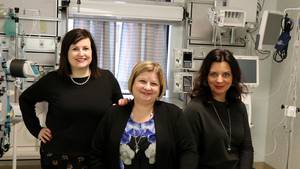When 16-year-old Ellie O’Brien could no longer make it through an entire dance class without feeling drained, she knew something was wrong. As a busy and active teenager, the inability to keep up with her fellow dancers was devastating.
Soon Ellie was so sick it even became difficult for her to walk. Her mom rushed her to the emergency department at the QEII, where tests revealed that Ellie’s kidneys were only working at about five per cent. She was then diagnosed with kidney failure.
“This was the scariest moment of my life,” Ellie says. “It felt like everything fell away, and all I could think was, ‘My life is over.’ ”
Fourteen gruelling months of dialysis followed, with nearly 20 hours a week spent at the health centre. In the meantime, Ellie was on the transplant list but felt hopeless after learning that no one in her family was a match. When her mom’s best friend, Margaret, went through testing and turned out to be a viable match, Ellie was overwhelmed with hope.
In July 2009, Ellie had a successful kidney transplant at the QEII. Now she is healthy and happy as she studies nursing at St. Francis Xavier University.
“I didn’t consider going into nursing until I went through dialysis and my transplantation,” says Ellie. “I was surrounded by nurses at the QEII — they’re the best people in the world.”
The QEII is the only health centre in Atlantic Canada that can perform organ transplants for patients. The Multi-Organ Transplant Program, providing kidney, liver, heart and pancreas transplantation services, has performed about 3,500 transplants since 1969.
Dr. Ian Alwayn, surgical lead for the program, was named the inaugural QEII Foundation Endowed Chair in Transplantation Research last October. Thanks to Roche Canada, RBC and other QEII Foundation donors, the research chair appointment provides stable long-term funding for Dr. Alwayn’s research, enhancing care for future patients like Ellie.
In his clinical research, Dr. Alwayn focuses on improving the quality of life for patients before and after they receive a transplant. His laboratory research focuses primarily on improving the quality of organs before transplantation so they have improved function once they are transplanted.
“Many of my colleagues are doing research that can benefit transplant patients, and as chair I believe it is important to bring research in our program together to allow for more collaboration to project our research outside of Halifax, nationally and internationally, and build collaborations with other programs,” says Dr. Alwayn.
Organs such as the kidneys, liver and heart can fail and require replacement as the result of a number of diseases.
“We have a lot of patients who lose kidney function because of diabetes or from hypertension or cardiovascular disease, and there are also infections that can cause kidney disease that require dialysis or a transplant,” says Dr. Alwayn.
“Life expectancy after a kidney transplant is far better than life expectancy on dialysis.”
Heart or liver transplant recipients often are patients who are so sick that they are in hospital as they wait for a suitable donor.
“Organ transplants not only save lives but also offer a significant improvement in the quality of life for the recipients,” says Dr. Alwayn.
“I think it also gives donors’ families, who have been through something very tragic, the opportunity to make sense of that tragedy, having their loved one’s organs live on in another individual.”
In fact, organ transplantation is very much a team effort.
“It’s not only the surgeons, cardiologists, hepatologists and nephrologists but also all of the other allied health professionals, including nurses, co-ordinators, physiotherapists, pharmacists, dietitians, social workers, psychologists who pull everything together,” says Dr. Alwayn.
“It’s a whole team of people dedicated to making transplants possible and improving the quality of life for our patients.”








